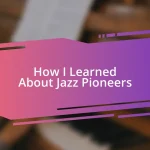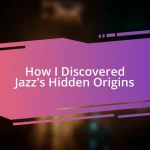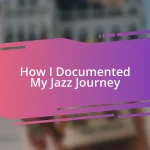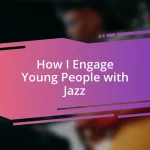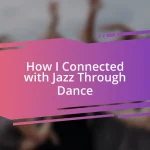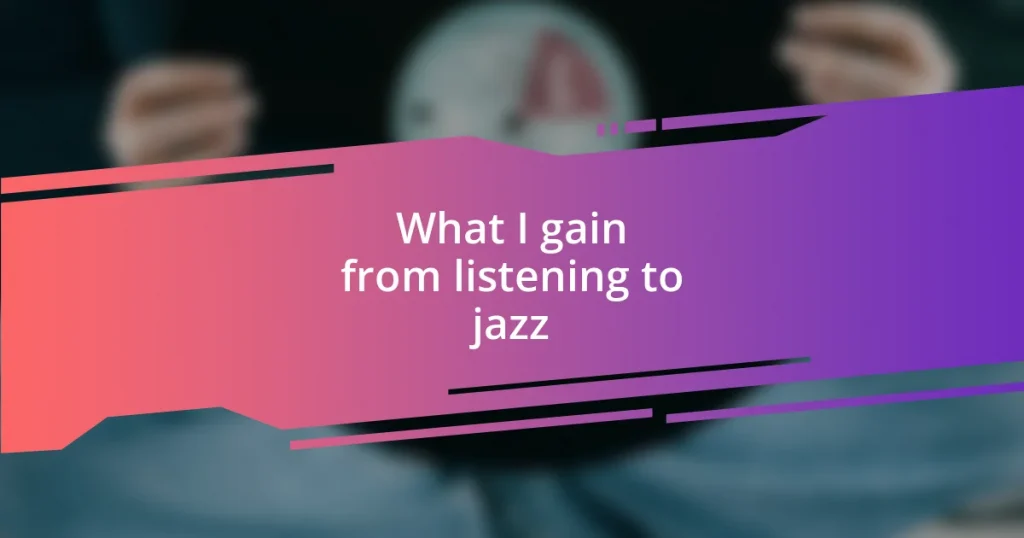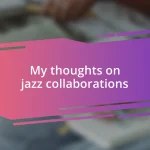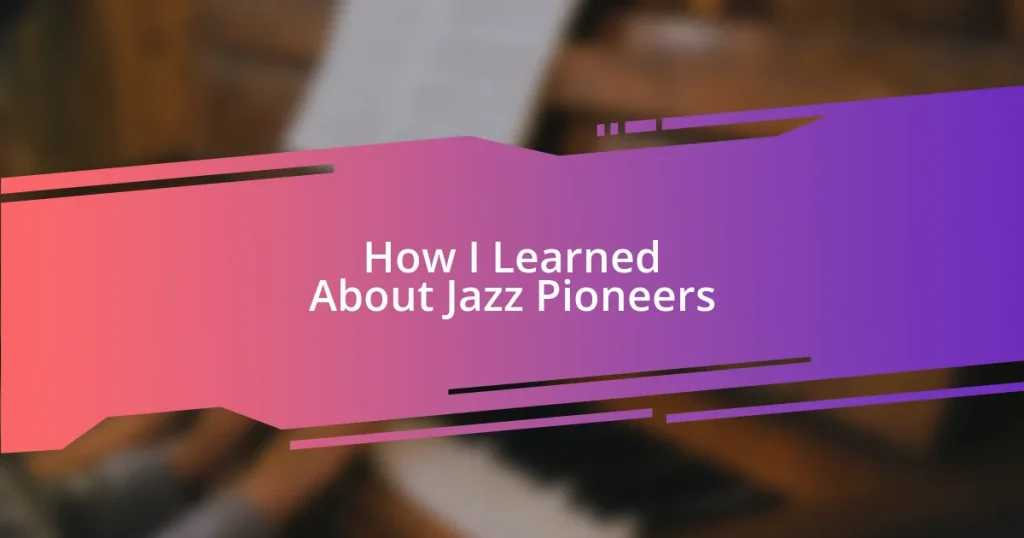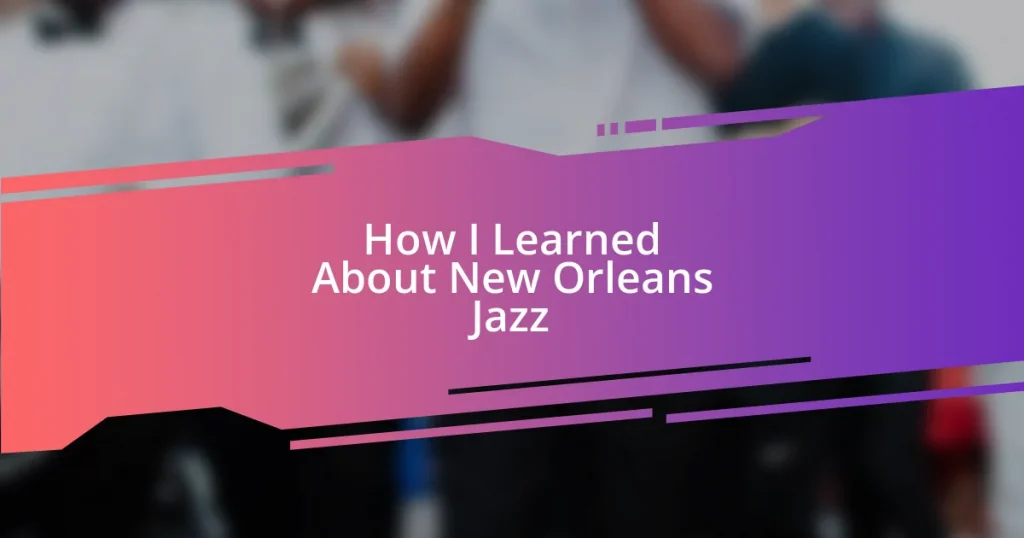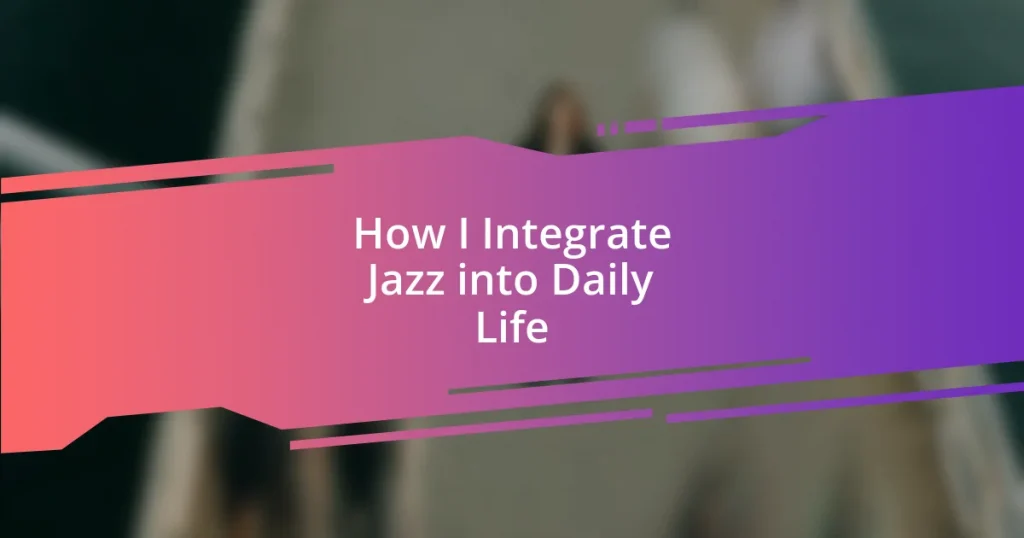Key takeaways:
- Listening to jazz enhances emotional wellbeing by providing comfort, encouraging vulnerability, and facilitating catharsis.
- The improvisational nature of jazz stimulates creativity and inspires risk-taking in thought processes.
- Experiencing jazz culture fosters connections, diversity, and community, enriching both personal and collective musical journeys.
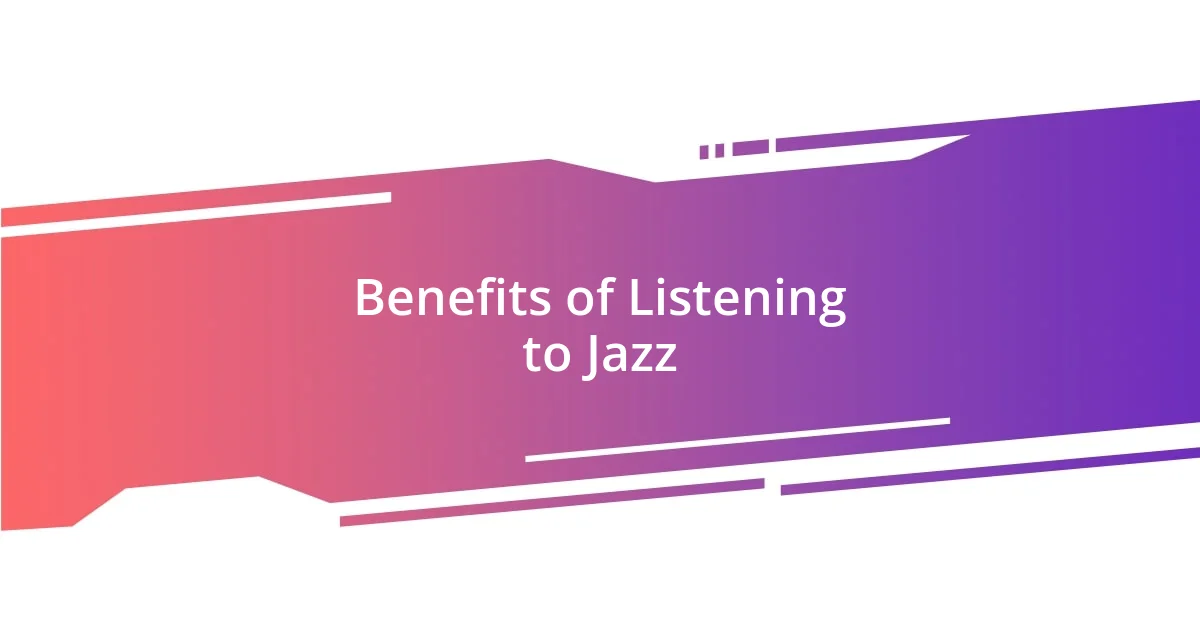
Benefits of Listening to Jazz
Listening to jazz has this remarkable ability to elevate my mood, especially after a long day. I remember one particular evening, feeling overwhelmed by work, I put on some Miles Davis. Suddenly, the smooth sounds filled my space, and it felt as if all my stress melted away. Isn’t it fascinating how music can change our emotional landscape so quickly?
Additionally, jazz encourages creativity in ways that I find truly inspiring. When I listen to an improvisation, I can almost feel the artists experimenting and pushing boundaries, allowing me to embrace my own creative impulses. It struck me once while doodling at a café; as the piano danced through the air, my pen started flowing like never before. Have you ever noticed how certain tunes can spark your imagination?
Moreover, I’ve discovered that jazz fosters a sense of connection with others. Attending live performances often feels like sharing an intimate experience with everyone around me. Once, while swaying to a saxophone solo, a stranger and I exchanged smiles, and in that brief moment, we were both part of something larger than ourselves. Isn’t it amazing how music can bridge gaps and foster camaraderie among strangers?
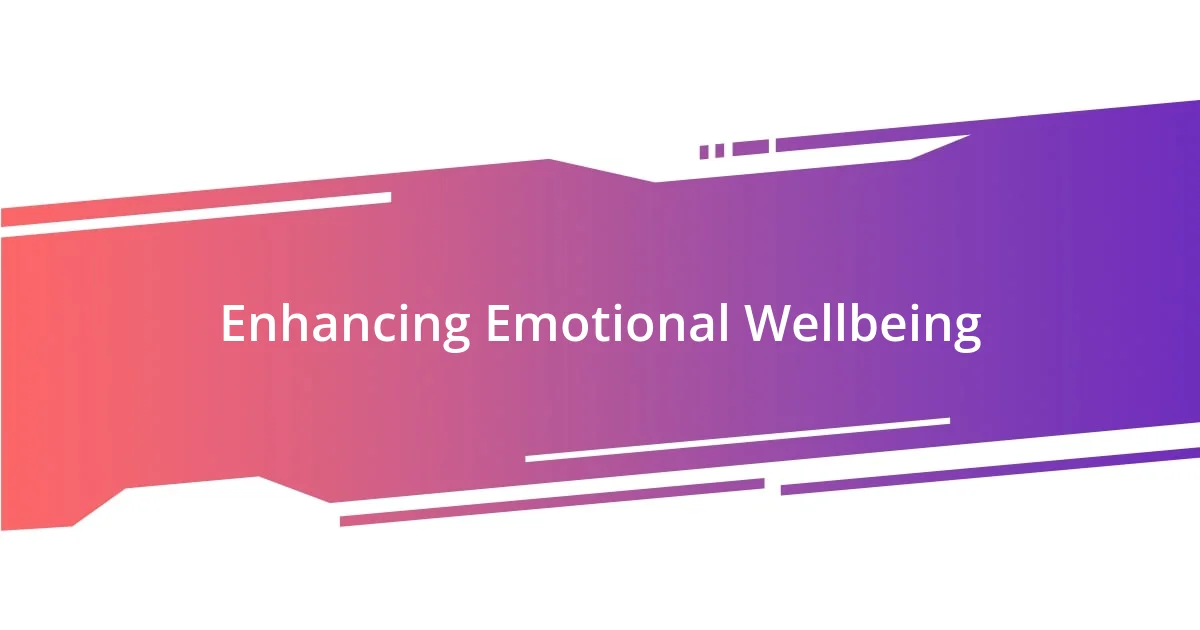
Enhancing Emotional Wellbeing
Listening to jazz can significantly enhance emotional wellbeing by providing a comforting backdrop for reflection. During particularly tough days, I’ve found that putting on some John Coltrane helps me process my feelings. The way those notes ebb and flow brings a kind of serenity that feels like a warm hug when I need it the most. Have you ever noticed how a simple melody can draw out emotions you didn’t realize you were holding?
Another way jazz contributes to my emotional health is by inviting me to embrace vulnerability. There was an afternoon when I was feeling particularly introspective, and I sat alone at home, letting Bill Evans’s piano serenade me. Each chord seemed to echo my thoughts, allowing me to confront feelings I often push aside. Jazz teaches us that it’s okay to be exposed and raw; it’s a safe space to exist with our emotions without judgment.
In my experience, jazz also provides a great outlet for catharsis. I recall a moment at a friend’s gathering where we all joined in a spontaneous jam session. Even though I can’t play an instrument, I found myself swaying and expressing my thoughts through movement. The collective energy of the group lifted my spirits and reminded me that emotional release can happen in numerous ways. Isn’t it remarkable how music, even in a communal setting, can drive the weight of our worries away?
| Aspect | Jazz Effect |
|---|---|
| Emotional Comfort | Provides a soothing backdrop for reflection and stress relief. |
| Embracing Vulnerability | Encourages confronting deep feelings through emotional melodies. |
| Cathartic Release | Facilitates emotional expression and connection in communal experiences. |
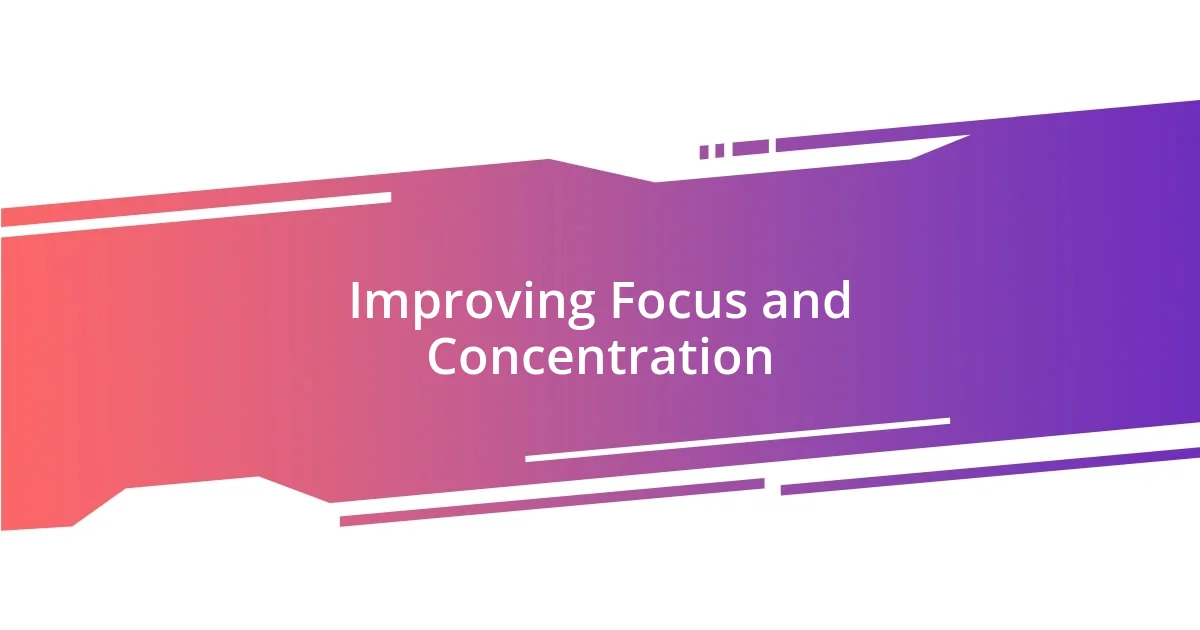
Improving Focus and Concentration
Listening to jazz has an intriguing impact on my focus and concentration. I often find that when I’m working on a challenging task, the fluid rhythms of jazz keep my mind engaged without overwhelming me. One afternoon, while tackling a complex project, I decided to turn on some smooth jazz in the background. The melodies felt like gentle nudges, guiding my thoughts and helping me brainstorm ideas more effectively. It’s fascinating how the right music can really enhance cognitive function!
Here’s some insight into how jazz can sharpen focus:
- Stimulating Brain Activity: The improvisational nature of jazz engages different areas of the brain, which can aid in problem-solving.
- Creating a Calm Environment: Jazz has a soothing quality that helps reduce anxiety, allowing for deeper concentration.
- Enhancing Flow State: The rhythm and unpredictability of jazz can push me into a state of flow, where my productivity soars.
In my experience, the gentle syncopation of jazz encourages sustained attention and helps to block out distractions. During late-night study sessions, I’ve often created playlists filled with mellow jazz pieces to maintain my stamina. I remember one night, fully immersed in a paper, I had the elegant sounds of Ahmad Jamal flowing through my room. Each note painted a backdrop that kept my focus razor-sharp, and hours seemed to pass in blissful productivity. Isn’t it amazing how the right sounds can amplify our concentration and enhance our ability to think clearly?
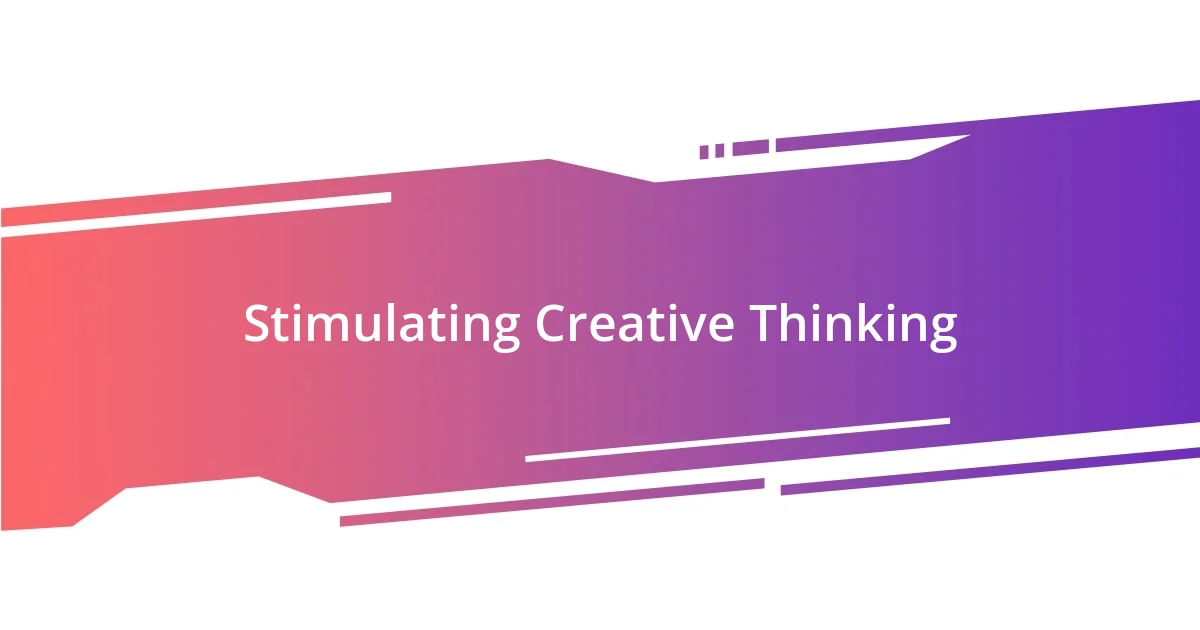
Stimulating Creative Thinking
Listening to jazz also acts as a powerful catalyst for stimulating creative thinking. I often find that the spontaneous nature of jazz can awaken parts of my brain that feel dormant when I’m stuck in a routine. Take, for example, a moment when I decided to draft a new article while some Ella Fitzgerald played softly in the background. As the music swelled, I noticed my ideas flowing more freely, as if each note was unlocking a door to inspiration I hadn’t accessed before. Have you ever felt that sudden spark of creativity just from a few bars of a song?
Moreover, the improvisational element of jazz encourages experimentation, which is essential for creativity. When I listen to a saxophonist weaving through different melodies, I am reminded to be bold with my own ideas. It’s like jazz invites me to take risks, to step outside my comfort zone. I recall a weekend brainstorming session with friends where we put on some funky jazz fusion. With each twist and turn in the music, our discussion ebbed and flowed seamlessly, leading to wild, yet innovative ideas we wouldn’t have considered otherwise. Isn’t it fascinating how music can turn a simple conversation into a vibrant exchange of creativity?
Ultimately, jazz teaches me that creativity thrives in unpredictability. I remember attending a live jazz performance, where the musicians took chances, often playing off one another in surprising ways. Their boldness infused the room with energy, and I left feeling invigorated. It made me realize that accepting the unexpected, whether in music or life, can lead to the most incredible breakthroughs. Don’t you think allowing spontaneity to guide our thoughts might lead us to discover hidden gems of creativity?
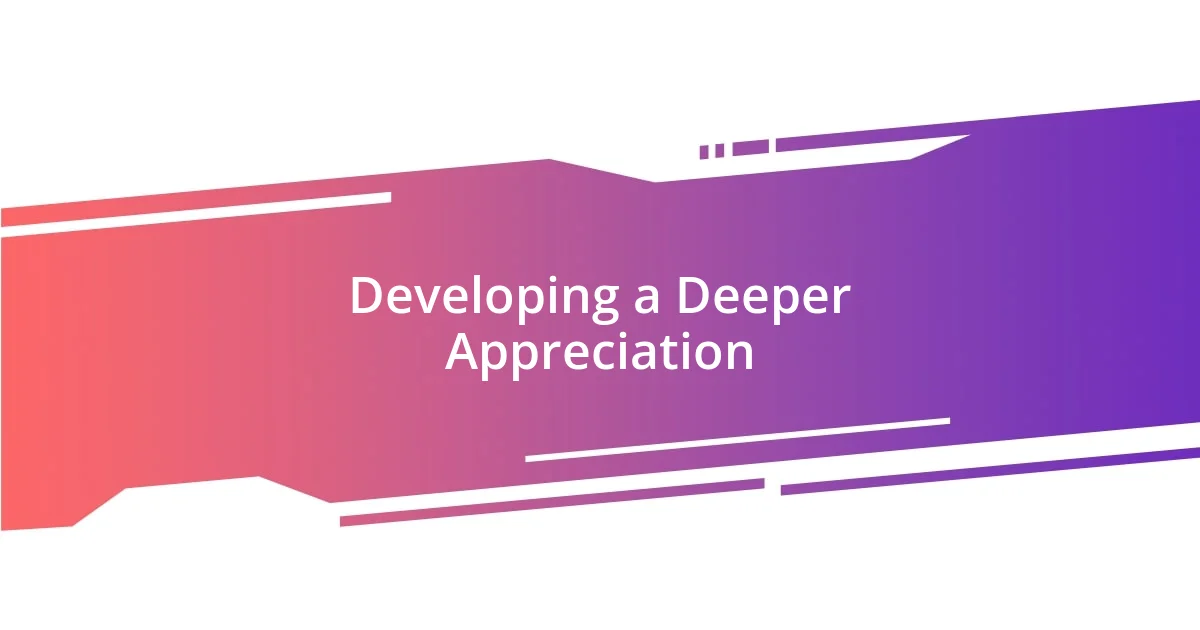
Developing a Deeper Appreciation
Developing a deeper appreciation for jazz has profoundly influenced my understanding of music and its nuances. I distinctly remember the first time I listened to Miles Davis’s “Kind of Blue.” It was a late summer evening, and as I got lost in the smooth transitions between each track, I felt as if the music was illustrating a story I never knew I needed to hear. Each note seemed to matter; I realized then that jazz isn’t just sound, but a rich tapestry of emotion and expression. Have you ever felt that a particular piece of music opened your eyes to something entirely new?
As my journey with jazz continued, I became more attuned to its complex structures and improvisational beauty. Early on, I would often replay the same tracks, but eventually, I learned to appreciate how each listen could reveal something different. One day, while sitting in a cozy café, I found myself captivated by Thelonious Monk’s “Blue Monk.” The way the melodies danced around unexpected turns was like watching the sunset gradually reveal a vibrant palette of colors. I can’t help but wonder—doesn’t that sort of unpredictability also reflect our own lives?
Now, when I immerse myself in jazz, I hear the collaborative spirit among musicians; it’s as if they’re having a conversation with their instruments. I recall a jam session I attended, where a group of artists floored the audience, spontaneously weaving their individual styles together. The energy was palpable, and I realized that appreciation for jazz extends beyond listening; it’s about understanding the heart and soul poured into each performance. This sense of connection is transformative—perhaps that’s what makes jazz so timeless and captivating. Isn’t it amazing how a genre can bring us closer to not just the music, but to each other as well?
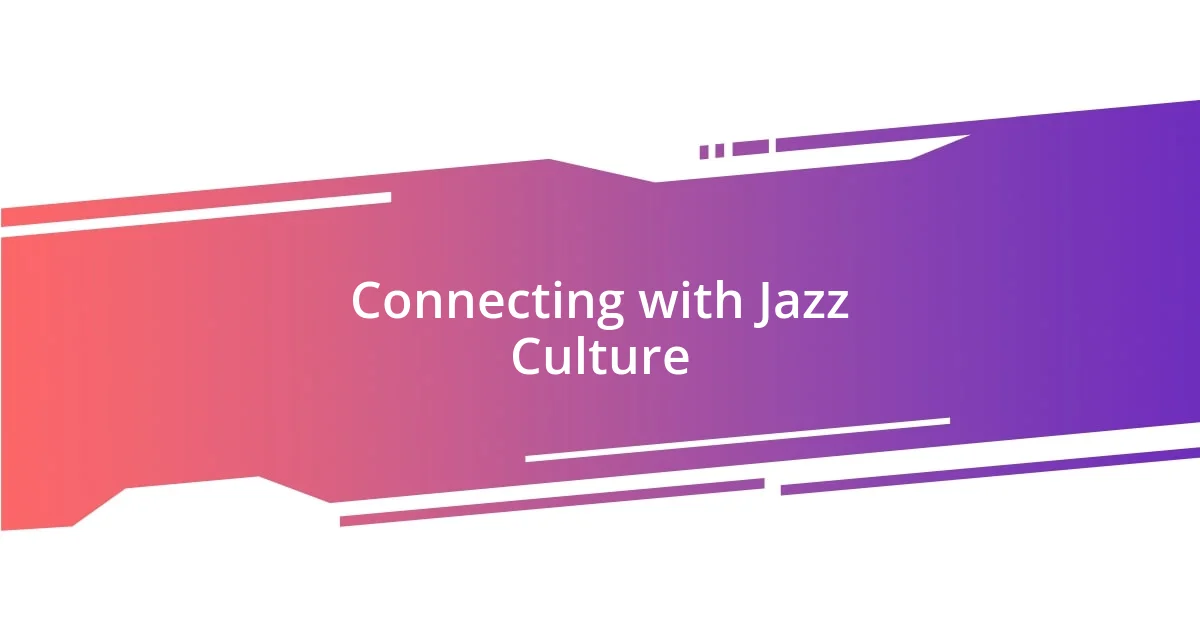
Connecting with Jazz Culture
Experiencing jazz culture is like stepping into a vibrant community that thrives on connection and creativity. I still vividly remember my first encounter at a local jazz festival; the energy was infectious. As I mingled with fellow jazz enthusiasts, it struck me how deeply this music resonates within people, creating an instant bond among strangers. Have you ever felt that heartbeat of shared passion in a crowd? It’s invigorating and reminds me why I love this genre so deeply.
Attending live performances has also been a transformative experience for me. I’ll never forget one night at a small jazz club, where the musicians fed off each other’s energy, creating an extraordinary connection that seemed to transcend the stage. I felt the thrill of uncertainty in the air; each musician was not merely playing notes but weaving an intricate tapestry of sound that invited the audience to join in the experience. It made me think: isn’t that what we seek, too—authentic connections that pull us out of our daily rhythms?
I often find that exploring jazz culture goes beyond the music itself. Some time ago, I joined a community jazz workshop where we learned not only to play but also to listen and respond to one another. The other participants hailed from all walks of life, and it was fascinating to observe how each person’s background influenced their approach to jazz. I realized that jazz culture is a mirror of society, reflecting diversity and collaboration. Isn’t it incredible how music can unite us in such a profound way?
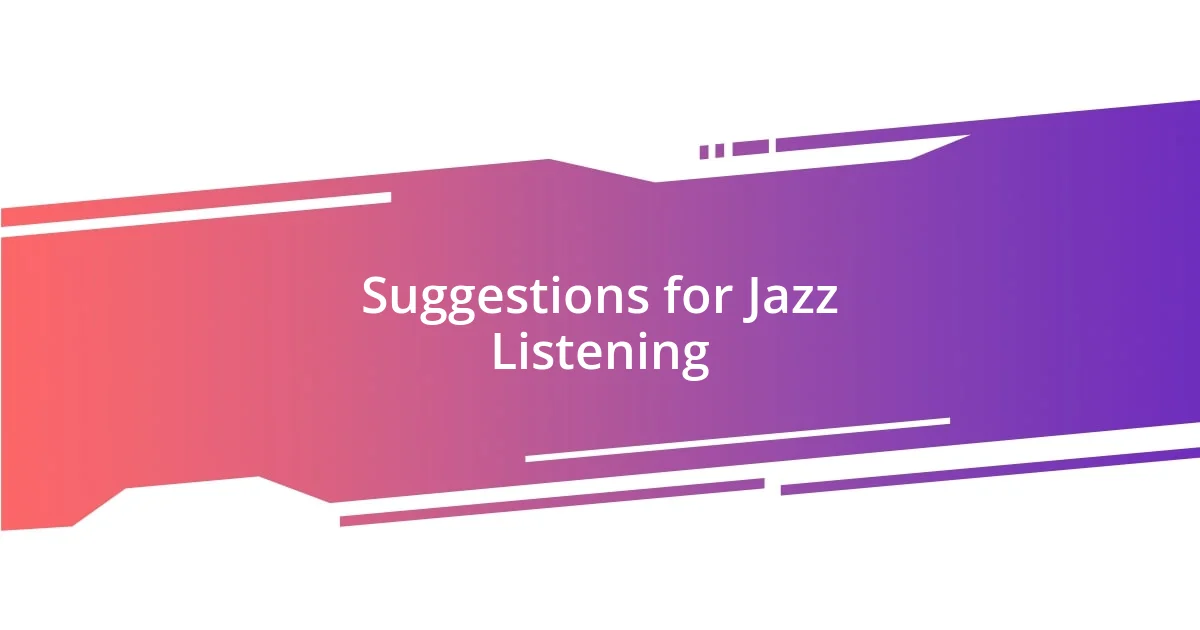
Suggestions for Jazz Listening
Listening to jazz can be a deeply personal and enriching experience, but to truly enhance that journey, I often suggest starting with curated playlists. For instance, I created a playlist titled “Jazz Essentials,” featuring iconic tracks from legends like John Coltrane and Ella Fitzgerald. This not only introduces you to classic works but also allows you to hear the evolution of jazz over the years. Have you ever found that a thoughtful playlist can set the mood for a specific moment in your life?
Exploring different subgenres of jazz can also be incredibly rewarding. One of my favorite evenings was spent delving into the sultry world of jazz blues. The way artists like B.B. King convey raw emotion through their music struck a chord in me, evoking feelings I didn’t know I had. I remember just sitting back, letting the sound wash over me, contemplating how each note connected with my own experiences. Isn’t it fascinating how a genre can resonate so deeply with our personal stories?
I also encourage attending listening parties, where you can gather with friends and share your thoughts on various tracks. I vividly recall a night spent with friends discussing the complex improvisations in a Charles Mingus piece. We bounced ideas around, laughably trying to decode the emotions behind each note. Those conversations brought us closer together, and it struck me that music is not just about what you hear; it’s also about the connections formed while experiencing it together. Don’t you think that sharing the journey of discovery makes it all the more special?
